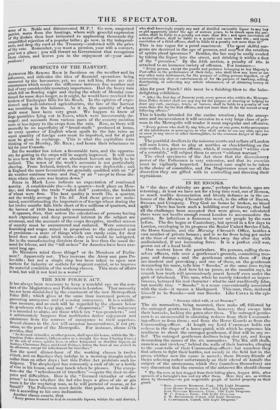THE NEW POLICE ACT.
IT has always been necessary to keep a watchful eye on the con- duct of the Magistrates and Policemen in London. That necessity has not been diminished by the enactment of the new Metropolitan Police Bill ; which gives at the same time increased powers of preventing annoyance and of causing annoyance. It is a middle- class measure, and as such will be regarded by the classes below the gentlemen who keep gigs, and " shopocrates." The nuisances it is intended to abate, are those which vex " ten-pounders ; " and it unlbrtunately happens that multitudes derive enjoyment and subsistence from the sources of annoyance to their superiors. Several clauses in the Act will occasion inconvenience, it' not pri- vation, to the poor of the Metropolis. For instance, clause 47th provides, that "No licensed victualler, or other person, shall open his house, within the Me- tropolitan Police district, (fifteen miles in a straight line from Charing Cross,) for the sale of wines, spirits, beer, or other fermented or distilled liquors, On Sundays, Christmas l)ws, and hood it VS, before the hour of one o'clock in the afternoon, except tot refreshment for travellers."
Now the usual dinner-hour of the working classes is twelve o'clock, and on Sundays they indulge in a morning draught rather earlier than on other days ; but this Police Act prohibits such in- dulgence. The shopkeeper has commonly a cask of ale or a bottle of wine in his house, and may lunch when he pleases. The excep- tion—for the " refreshment of travellers "—opens the door to dis- putes and difficulties. How is the "licensed victualler or other person" to know whether the lad who buys a glass of ale or gin wants it for the wayfaring man, as he will pretend of course, or fbr himself? The Policeman must decide that point, and he will de- cide It according to his own inclination. Another clause enacts, that
"Every person licensed to deal in exciseable liquors, within the said district, who shall knowingly supply any sort of distilled exciseable liquor to any boy or girl apparently under the age of sixteen years, to be drunk upon the pre- mises, shall be liable to a penalty not more than 20s. ; and upon conviction of a second offence, shall be liable to a penalty not more than 40s.; and upon conviction of a third offence, shall be liable to a penalty not more than 51."
This is too vague for a penal enactment. Theligost skilful sur- geons are deceived in the age of persons, and mafitot the retailers of spirits plead ignorance ? Besides, the law may be easily evaded by taking the liquor into the street, and drinking it within a foot of the "premises." By the 54th section, a penalty of 40s. is attached to an immense variety of offences. For instance- " Every person, except the guards and postmen belonging to her Majesty's Post-office m the performance of their duty, who shall blow any horn or use any other noisy instrument, for the purpose of calling persons together, or of announcing any slaw or entertainment, or for the purpose of hawking, selling, distributing, or collecting any article whatsoever, or of obtaining money or alms."
Alas for poor Punch ! this must be a finishing-blow to the babe- delighting exhibition.
" After the first day of January next, every person who within the Metropo- litan Police district shall use :my dog for the purpose of drawing or helping to draw any cart, carriage, truck, or harrow, shall he liable to a penalty of not more than 40s. for the first offence, and not more than 51. for the second or any following offence."
This is kindly intended for the canine creation; but the annoy- ance and inconvenience it will occasion to a very large class of per- sons in the Metropolis will render it most unpopular and offensive.
" Every person who shall ply any kite, or play at ant, game, to the annoyance of the inhabitants or passengers, or who shall make or use any slide upon ice or snow in any street or other thoroughfare, to the common danger of the pas- sengers."
'rite youthful dwellers in the noisome courts and cellars of London will soon learn, that to play at marbles or 6nd:farthing on the side-walks, is a grievous offence, which, it' committed " within view of a constable," will subject them to arrest "without warrant."
The cited specimens of the Act show that the discretionary power of the Policemen is very extensive, and that its exercise
must be vigilantly inspected. Increased care ought to be taken in the choice of constables, and the Magistrates must use all the discretion they are gifted with in controlling and directing their
myrmidons.


























 Previous page
Previous page